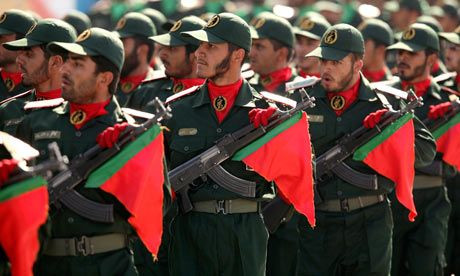Iran Deploys Revolutionary Guard To Iraq To Support Maliki Government Forces

Tehran's entrance into Iraq, on the pretext of protecting Shia sites, may lead to a region-wide conflict.
Iran deployed an elite unit of its Revolutionary Guard to Iraq as the Islamic State of Iraq and Syria (ISIS) continues to gain ground in the northern part of the country.
Iran is dominated by Shia Muslims -- a group that is also predominant in the Iraqi government and military forces -- and has a special interest in fighting the Sunni Muslim ISIS.
“This is certainly threatening to the Shia areas and to Prime Minister Maliki, and is a way to mobilize support,” Denise Natali, senior research fellow at the National Defense Institute in Washington, said.
According to Iranian security forces, at least three battalions of the Quds Force, the elite overseas branch of the Revolutionary Guard, were dispatched to Iraq to fight off ISIS, a Sunni militant group that claims it has ties to al-Qaeda.
The guards were dispatched particularly to help the Iraqi military fight ISIS in Saddam Hussein’s hometown of Tikrit Thursday. The town was initially taken over by the militant group, but was later reclaimed, at least in part, by the military and the special forces from Iran.
But the Iranian forces in Iraq have a stronger interest in protecting what Natali calls an “existential threat to Shia shrines.” ISIS has threatened to raid Karbala and Najaf, which are be some of the most sacred shrines to Shias worldwide, and views them as the perfect battle ground to fight Maliki and his military forces. Iran wants to protect them.
But it is still unclear how far Iran will go to protect its Shia brothers in Iraq. It is also facing a crisis in Syria as President Bashar Al Assad, an Alawite and Shia, fights the Sunni-dominated opposition groups in the country. So far Iran has not intervened directly; it has not sent soldiers into the country, but is thought to be sending money and weapons to Assad’s military.
As the conflict in Iraq continues to grow, Iran will have to face two separate battles that could collide into one massive conflict. ISIS has taken over Mosul and other surrounding areas, giving it control over a piece of land that stretches all the way from northern Syria to Fallujah. Videos and images of the militant group bulldozing the border between the two countries appeared on social media Thursday.
With the border becoming more and more porous, ISIS weapons and fighters are able to flow more fluidly.
Austin Long, a professor at Columbia University and a former employee at the RAND Corporation, described it as “pool of water sloshing back and forth,” saying that ISIS forces operating in Iraq will now have access to more funding and more recruiting.
“This is huge. It gives them an expansive room to operate. The fact of the matter is even though ISIS remains in the Sunni Arab regions they now have the access to other non-Sunni areas,” Natali said.
© Copyright IBTimes 2025. All rights reserved.





















